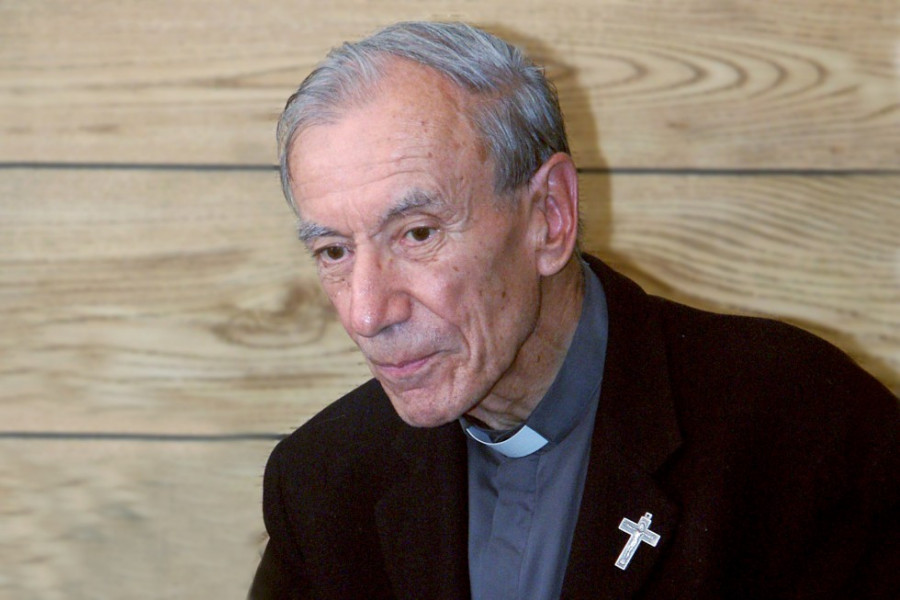Theologian and Sociologist Don Patrick de Laubier Passed Away

Don Patrick de Laubier, a renowned Catholic theologian and priest from Switzerland, sociologist, Professor emeritus of the University of Geneva, member of St Philaret`s Christian Orthodox Institutes Board of Trustees, passed away yesterday, February 28.
In the past few years, Don Patrick was actively teaching as a visiting scholar, according to Professor George Nivas. The funeral service took place in Geneva in the Basilica Notre-Dame on Wednesday, March 2.
Fr Georgy Kochetkov, SFI Rector: May the Lord rest his soul as His Own knight and faithful servant! We will remember with gratitude both his person and his life.
Dmitry Gasak, First Vice-Rector, SFI: When people met Don Patrick, they were always pleasantly surprised by his friendliness, his open manner, his sincerity, his tact and consideration both in relating to people and in treating the difficult matter of church unity. He was a true Christian, a man of genuine and fiery faith. He knew very well what keeping your vows meant. We often forget what our baptismal vows entail, but to him this was a real knowledge and a daily experience.
We met Don Patrick in the late 1990s. As far as I remember, it was his initiative. He was running a European training programme for Russian students affiliated to the University of Geneva. The goal was to give them a chance to see life in Europe, to listen to different professors and lecturers from Swiss, French and German universities on various topics, from economics to family problems, naturally including philosophy and theology.
This project was one of his initiatives to bring Russia and the West closer together, to bridge the gap between the Orthodox and the Catholic church. He perceived the schism as sin, as a great woe, and as a historic tragedy of Christianity. This was not just an academic position, he felt a personal responsibility to do everything in his power to overcome the division. He was a very open and a very considerate person, he knew all the difficulties involved and realised that in matters of friendship and unity it is sometimes essential to learn to wait for the other party to come along.
So, for a number of years, he would take Russian students to Geneva for comparatively long study programmes. These were students from different schools, which served the additional purpose of promoting dialogue between different universities, including theology schools in Russia. He was well aware of the deficit of this dialogue and unity in Russia. At the time, he was a Professor of Sociology at Geneva University, and the circle of academics who lectured in his programme was his circle of friends.
Don Patrick was also a very modest person, to the point of being an ascetic I would say. You couldn’t fail to notice that if you got a chance to see the way he lived both in Geneva and in Paris. We have also had people like that in Russia – people who were both academically distinguished and at the same time had genuine faith and knew what it meant to follow the narrow path. And this faith and this spiritual journey of Don Patrick brought fruit.
He was one of those who made it possible for Russian believers from academic and cultural background to meet with the Pope, then John Paul II. Sergey Averintsev and Olga Sedakova were among those who took part in these meetings at the time. He realised that with all the problems accumulated over two thousand years of Christian history, unity among Christians is not something you can achieve overnight. He knew that this unity, these links of communication and these relationships need to be built in different areas and different spheres of life, and he worked hard to make it happen. And when our Institute asked him to join its Board of Trustees, he agreed gladly.
He was ordained when he stopped his academic work at the University and retired. I can remember asking him, “Don Patrick, what is your appointment, where will you serve as priest now?” He spread his arms and said, “The whole world.” He did not speak Russian fluently, but sometimes said a phrase or two in Russian, and every time it was something beautiful and significant, like on this occasion. He was a man of universal scale, a truly catholic scale I would say, something that both Catholics and Orthodox badly need.
All that remains for us to do is to thank God for meeting people like that. It is also a great joy to think that he did witness the meeting between Pope Francis and Patriarch Kirill. I think this meeting took place, in part, thanks to his prayers, and that in a way, this was God’s answer to them.